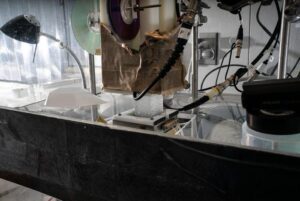
Proceedings of the National Academy of Sciences—Lead mining in the Roman era resulted in widespread lead pollution and cognitive decline, according to a study. The negative impact of lead exposure in the modern era on human health and development has been widely recognized. Historical and archaeological records indicate that European populations in the Roman era also had high levels of lead exposure, including from air pollution associated with the large-scale mining and smelting of silver and lead ores. Joseph McConnell and colleagues used Artic ice core records and atmospheric aerosol modeling to estimate the concentrations and potential health impact of lead in European air during the height of the Roman Empire, called the Pax Romana. Analysis of three ice cores spanning 500 BCE to 600 CE indicated that European lead emissions sharply increased around 15 BCE, following the rise of the Roman Empire, remained high until the decline of the Pax Romana, beginning around 165 CE, and were not exceeded until the early 2nd millennium CE. Based on modern epidemiological studies, the authors estimated that atmospheric lead pollution during the Pax Romana would have resulted in an average increase in childhood blood lead levels of around 2.4 micrograms per deciliter. According to the authors, childhood lead exposure would have led to widespread cognitive declines of 2.5–3 IQ points throughout the Roman Empire.
__________________________

High-resolution measurement of Roman era lead pollution in Arctic ice cores at the Desert Research Institute. Jessi LeMay
__________________________
Article Source: PNAS news release
*“Pan-European atmospheric lead pollution, enhanced blood lead levels, and cognitive decline from Roman-era mining and smelting,” by Joseph R. McConnell et al., Proceedings of the National Academy of Sciences, 6-Jan-2025. https://www.pnas.org/cgi/doi/10.1073/pnas.2419630121
__________________________
Advertisement

EXPLORE THE ANCIENT ETRUSCANS IN PERSON!
Experience a unique, up-close-and-personal hike among ancient hilltop towns in central Italy. You will walk the sensational countryside of the regions of Umbria and Tuscany, soaking in important sites attesting to the advanced Etruscan civilization, forerunners of the ancient Romans; imposing architectural and cultural remains of Medieval Italy; local food and drink; and perhaps best of all — spectacular scenic views! Join us in this collaborative event for the trip of a lifetime!



